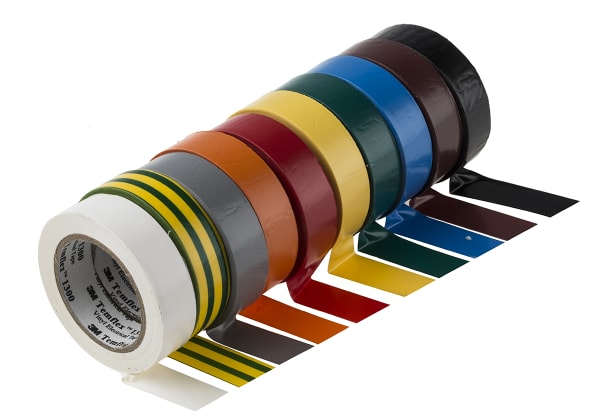- Published 17 Jan 2023
- Last Modified 29 Aug 2023
- 8 min
Electrical Insulation Tape Material Chart Guide

To learn more about electrical insulation tape, visit our electrical tape types and alternatives guide or our electrical tape colour chart guide.
What is Electrical Tape Made of?
The key properties of a reliable and trustworthy electrical insulating tape are that it must:
- Act as an effective insulator against electricity, protecting users and circuitry by not conducting current easily
- Be heat-resistant and fireproof to a reasonable degree for the application it is being used in
- Be flexible, user-friendly and easy to apply to a range of wires, circuits and connections (often in relatively tight spaces)
By far the most common material for modern electrical tape is vinyl, but alternative materials are also available.
Different Types and Uses of Electrical Insulation Tape
Many electrical tape types are available today, with a wide variety of intended uses, key attributes, materials, colours and sizes on offer. As with most such products, the best kind to use will be entirely dependent on the scenario and the job you expect it to perform.
Below, we cover some of the different kinds of electrical tape and what sorts of applications they are most commonly found in.
Guide to Electrical Insulation Materials: Which One Should You Choose?
PTFE Electrical Tape
PTFE tape (polytetrafluoroethylene, a synthetic fluoropolymer) is prized for its extremely robust chemical resistance, due to it being almost universally inert. Often referred to as Teflon tape, it is highly insoluble even in harsh solvents at temperatures lower than 300 Celsius, offering good thermal stability without becoming brittle at very low or high temperatures. It also displays excellent dielectric properties, meaning it conducts practically no electricity when in contact with a current.
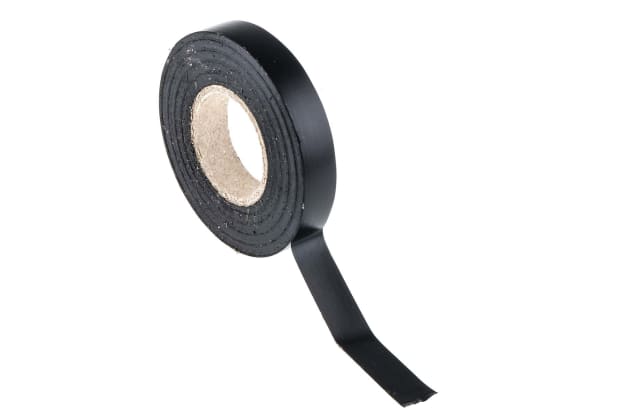
PVC Electrical Tape
PVC electrical tape (polyvinyl chloride) is one of several types of plastic electrical tape and is widely used in many similar scenarios to the standard vinyl electrical tape. However, PVC is generally favoured in scenarios where it is likely to be exposed to very low temperatures. Both vinyl and PVC are viewed as ‘balanced’ plastic tapes, suitable for a broad range of uses. Both have similar high-temperature properties, but PVC copes much better when the temperature drops.
PVC electrical tape is also more robust at dealing with other environmentally challenging factors such as adverse weather conditions, metal corrosion and abrasion. For this reason, it is often favoured for outdoor wiring applications where ruggedness is likely to be a bonus.
Mastic Electrical Tape
In the context of electrical tape, mastic refers to the same adhesive type as is commonly associated with decorating and tiling. Mastic tape is essentially a malleable sticky mass with a rubberised backing that is great for both repairs (it acts like a roll of putty) and insulation (the rubberised backing gives it fantastic dielectric properties).
Mastic is very often the first choice when the job calls for a high degree of moisture resistance, either from inclement weather or from humidity, steam and aerosols. It is also incredibly stretchy and flexible, making it good for padding and bulk-wrapping sharp components or connections that would risk abrasion and puncture of more brittle tape types.
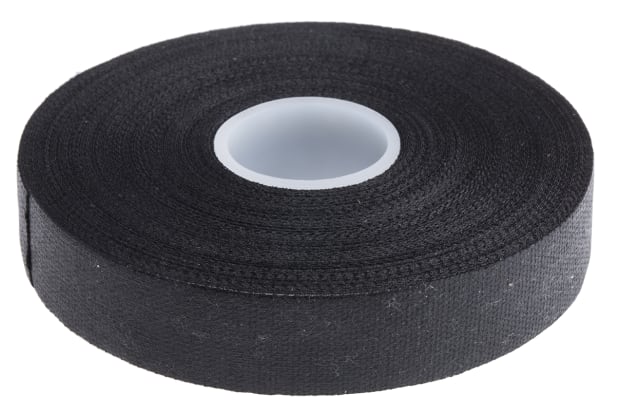
Cloth Electrical Tape
Among the main types of electrical tapes, cloth tape is generally less associated with strong dielectric properties, meaning that it is not the greatest choice for jobs where insulation is the key factor. However, cloth electrical tape is prized for its mechanical properties. It is a very strong and flexible hybrid excellent for fixes and repairs, and can often be found combined with other material types to help increase its temperature performance and conductive resistance.
Vinyl Electrical Tape
Highly popular and used around the world, vinyl tape is suitable for use with standard wiring, repair, and insulation tasks. It is the most common type of plastic electrical tape and is a great, versatile choice. Vinyl electrical tape is also ideal for applications which do not require a specialised product. This material provides a useful mix of functionality, durability, and protection for a wide range of conditions and situations.
Typically, vinyl electrical tape provides a decent level of protection from abrasion, chemicals, moisture, and variable temperatures. It is regularly used in low-voltage domestic and commercial electrical scenarios, making it a favourable material for repair work, insulation, protection, sealing, and colour coding on a variety of wiring jobs.
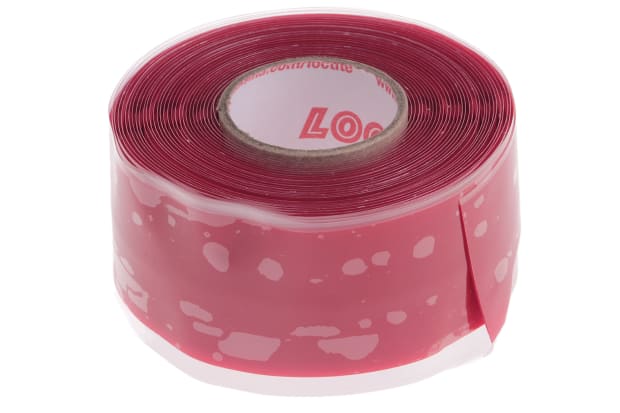
Rubber Electrical Tape
Rubber tape is something of an umbrella term, which covers a fairly wide range of subtypes. Vulcanised rubber tape is often used in cable jacketing and repairs where rugged environments - such as construction sites or industrial manufacturing plants - call for a very durable wrap.
Other types of rubber tape are chosen for their market-leading dielectric properties. Specialist premium products such as ethylene-propylene rubber tape are often found in medium-to-high-voltage applications, while general-purpose rubber wraps are also a popular choice for low voltage applications, repairs, padding and moisture seals.
Cambric Electrical Tape
Cambric tape usually refers to a cotton fabric electrical tape that is primed and coated in an insulating varnish. It is most commonly used as a mechanically tough, abrasion and puncture-resistant base layer in a wide range of repairs and protective applications.
Cambric electrical tape is sometimes applied to wiring and connections adhesive side up, before further layers of more dielectrically resistant tape varieties are added over the top. This creates a highly robust and durable wrap that is easy to remove cleanly for future maintenance, making it ideal for applications such as busbar insulation, motor leads and service drop connections.
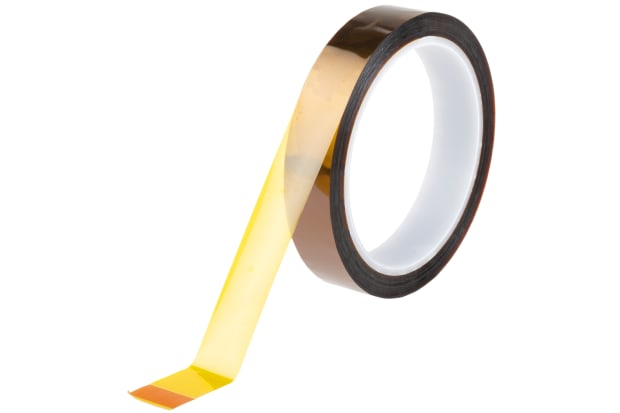
Polyimide Electrical Tape
Polyimide tape is mainly preferred in applications where a thin, durable tape with high-temperature stability is required. This makes it a leading choice for many demanding electronics tasks in the automotive, industrial and computing industries, such as wrapping or insulating coils, transformers, capacitors and PCBs.
Good dielectric performance means that it is also commonly used as a protective layer for delicate electrical components during soldering and circuit-building. It is generally flame-resistant and can withstand much higher short-term temperature spikes than many other types of electrical tape.
Self-Amalgamating Electrical Tape
Self-amalgamating electrical tape does not typically feature any adhesive or solvent ingredients. Instead, insulating tapes of this kind fuse to themselves when stretched and wrapped tightly around a wire or connection. The resulting bond is effectively seamless and can offer an added layer of protection against moisture ingress and current transfer.
Self-amalgamating tape is usually simple to remove for maintenance and repair due to its lack of adhesive. As a result, it is often used for short-term repairs against leaks and punctures. In electrical applications, it is commonly used to moisture-seal joints for insulation purposes, or splicing and making connections in high-voltage cable runs.
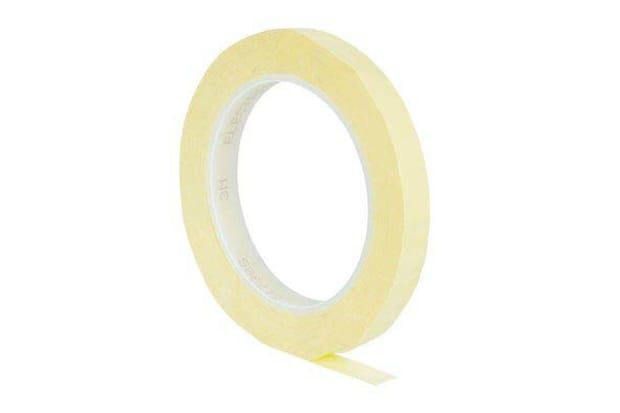
Polyester Electrical Tape
Polyester tape tends to be thin and durable, offering particularly tough resistance to edge-tear, abrasion and puncture. It is typically chemical, solvent and moisture resistant, as well as fairly flame retardant, and can be supplied with various sorts of adhesive backing including acrylic and thermosetting rubber.
Polyester electrical tape has solid dielectric properties and is a popular option in layer insulation and coil cover applications at higher temperatures (up to 130° Celsius).
Liquid Electrical Tape
Although it is not technically a tape in the usual sense of the word, liquid electrical tape is a product which is used for similar applications to standard electrical insulation tape. Essentially a synthetic rubber-based liquid, this substance can be applied using a brush to provide a strong coating.
Liquid electrical tape offers resistance to moisture, abrasion, UV light, and certain chemicals, in addition to boasting strong dielectric properties. It is quite a versatile material and is primarily found in the manufacturing industry, where it can be used for applications including colour-coding wiring and protecting or insulating cables and connections.
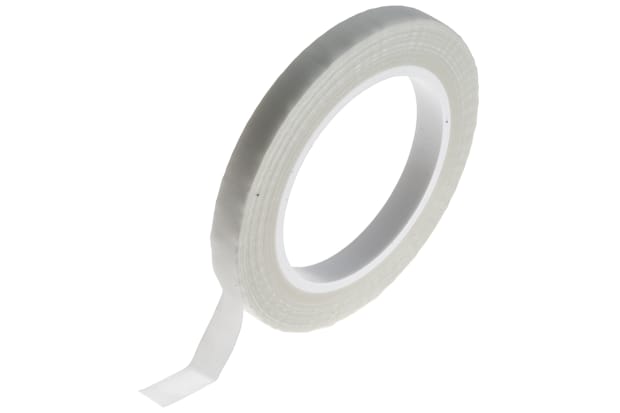
Glass Cloth Electrical Tape
Glass cloth tape is typically manufactured from a polyester film reinforced with glass fibre strands. It is used when much higher thermal resistance properties are needed. This tape is designed to withstand prolonged exposure to temperatures ranging from 130-200° Celsius, and is also mechanically tough, providing excellent durability against edge-tear and cut-through.
Frequently used as a heat-stable insulation layer, it is also a reasonable electrical insulator with high tensile strength. Glass cloth tape is widely used in applications such as oven controls and furnace power supply systems, in motor leads and switches, and for wrapping coils.

Silicone Rubber Electrical Tape
Silicon rubber tape boasts a particularly wide range of operating temperatures, typically from -80°C to around 200° Celsius at peak. It is also prized for its outstanding dielectric properties and chemical inertness, making it a reliable choice in applications where it might experience prolonged exposure to moisture, UV, ozone, harsh weather or radiation.
In addition, silicone rubber tape is extremely soft and pliable, making it convenient for wrapping around awkward shapes and in tight spaces. However, it is quite vulnerable to abrasion and puncture and does not offer a high degree of mechanical strength.
More Electrical Tape Guides
Related links
- Electrical Insulation Tape Colour Chart Guide
- Electrical Tape Types & Alternatives Guide
- White Electrical Tape
- Electrical Tapes
- RS PRO Brown PVC Electrical Insulation Tape, 19mm x 33m
- 3M Scotch Super 88 Black PVC Electrical Insulation Tape, 50mm x 33m
- 3M Scotch Vinyl Electrical Tape Super Black PVC Electrical Insulation Tape, 25.4mm x 33m
- DUCK TAPE Duck Tape Assorted PVC Electrical Insulation Tape, 19mm x 4m
